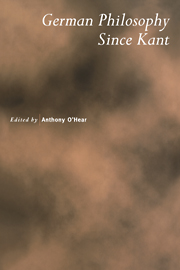Book contents
- Frontmatter
- Contents
- Preface
- Notes on Contributors
- Fichte and Schelling
- Hegel's Critique of Foundationalism in the ‘Doctrine of Essence’
- Schopenhauer's Pessimism
- Karl Marx
- Nietzsche's Virtues: A Personal Inquiry
- Bolzano, Brentano and Meinong: Three Austrian Realists
- Vorsprung durch Logik: The German Analytic Tradition
- German Philosophy of Mathematics from Gauss to Hilbert
- The Revolution of Moore and Russell: A Very British Coup?
- Husserl's Concept of Being: From Phenomenology to Metaphysics
- Frege and the Later Wittgenstein
- Otto Neurath, the Vienna Circle and the Austrian Tradition
- Does the Nothing Noth?
- Reactionary Modernism
- Adorno on Disenchantment: The Scepticism of Enlightened Reason
- Habermas, Science and Modernity
- German Philosophy Today: Between Idealism, Romanticism, and Pragmatism
- The Career of Aesthetics in German Thinking
- Hermeneutic and Analytic Philosophy. Two Complementary Versions of the Linguistic Turn?
- Index of Names
Bolzano, Brentano and Meinong: Three Austrian Realists
Published online by Cambridge University Press: 29 September 2009
- Frontmatter
- Contents
- Preface
- Notes on Contributors
- Fichte and Schelling
- Hegel's Critique of Foundationalism in the ‘Doctrine of Essence’
- Schopenhauer's Pessimism
- Karl Marx
- Nietzsche's Virtues: A Personal Inquiry
- Bolzano, Brentano and Meinong: Three Austrian Realists
- Vorsprung durch Logik: The German Analytic Tradition
- German Philosophy of Mathematics from Gauss to Hilbert
- The Revolution of Moore and Russell: A Very British Coup?
- Husserl's Concept of Being: From Phenomenology to Metaphysics
- Frege and the Later Wittgenstein
- Otto Neurath, the Vienna Circle and the Austrian Tradition
- Does the Nothing Noth?
- Reactionary Modernism
- Adorno on Disenchantment: The Scepticism of Enlightened Reason
- Habermas, Science and Modernity
- German Philosophy Today: Between Idealism, Romanticism, and Pragmatism
- The Career of Aesthetics in German Thinking
- Hermeneutic and Analytic Philosophy. Two Complementary Versions of the Linguistic Turn?
- Index of Names
Summary
Rudolf Haller zur Emeritierung in Freundschaft gewidmet
Introduction
The architect and publicist of the Vienna Circle Otto Neurath pointed out in the 1930s that the course taken by philosophy in the Habsburg Empire and the rump Republic of Austria differed markedly from that in the rest of the German-speaking world. Philosophy in Austria had, as he put it, spared itself the Kantian interlude. Until the temporary extinction of Austria in 1938 her philosophers, like her artists, musicians and writers, produced a disproportionately large amount of high quality creations. In philosophy this work was characterised by a rejection of all forms of idealism, an emphasis on psychological and linguistic analysis, respect for empirical science, a general mistrust of philosophical speculation, and stylistically by an eschewal of profound-sounding obscurity in favour of plain clarity of exposition and thought. Neurath's thesis was seconded and extended by Rudolf Haller, so that Barry Smith has termed the thesis of the distinctness of Austrian against German philosophy the Neurath–Haller Thesis.
In the late 1920s Gilbert Ryle offered a lecture course at Oxford University entitled ‘Bolzano, Brentano, Meinong and Husserl: Four Austrian Realists’. The course was soon dubbed ‘Ryle's three Austrian mountain railway stations and a parlour game’, or just ‘The Mountain Railway’.
- Type
- Chapter
- Information
- German Philosophy since Kant , pp. 109 - 136Publisher: Cambridge University PressPrint publication year: 1999
- 3
- Cited by



